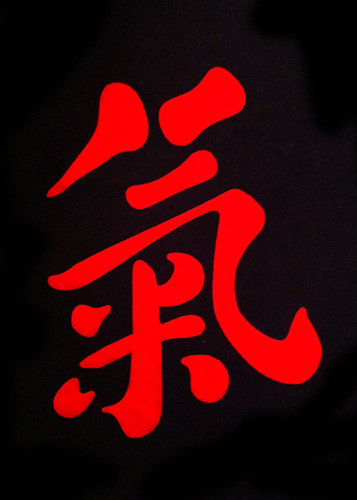
Qi (pronounced CH-EE) is often translated as 'life force', a sort of subtle energy that penetrates and influences each person in myriad ways. Qi permeates the universe, it can be seen in the rising of the sun, the flowering of the bud, and in the buzz of bee's wings. There are different types of qi, but the one that fascinates me, is prenatal qi.
Inherited from our parents, prenatal qi is sort of like the Western concept of the genetics we inherit from our parents, this is what we nourish throughout our life. Similar to genetics, prenatal qi can thrive with a good quality diet, air, water, and without it it can wither, or flare and cause problems. Given a good dose of strong, healthy prenatal qi, babies and children thrive in their childhood and beyond.
Other types of qi, such as lung qi, spleen qi, etc... can be improved upon, but prenatal qi is like a seed that cannot be replaced, it can only be nourished. Mothers however, can improve the quality of their health, thereby improving the prenatal qi that they pass on to their children. Dr Randall Neustaedter, says in his book, The Holistic Baby Guide, " In Chinese terms, a deficiency of Prenatal Qi is one of the primary causes of immune-system weakness and susceptibility to external pathogens. A mother who seeks out the care of a Chinese herbalist before and during her pregnancy is more likely to have a robust and healthy baby." He says that according to Chinese Medicine, a Prenatal Qi deficiency is one of the leading causes of asthma in children.
Gestating, delivering and nursing a child depletes the prenatal qi that the mother has available to pass on to the next child. Practitioners of Chinese Medicine believe that the different qualities and quantities of Prenatal Qi passed from mother to child account for the sometimes vast differences of energy and health between siblings. In order to avoid passing on any deficiencies to her baby, between and during subsequent pregnancies, it would behoove mothers to nourish and replenish these spent stores. Here are some great ways to do that:
Inherited from our parents, prenatal qi is sort of like the Western concept of the genetics we inherit from our parents, this is what we nourish throughout our life. Similar to genetics, prenatal qi can thrive with a good quality diet, air, water, and without it it can wither, or flare and cause problems. Given a good dose of strong, healthy prenatal qi, babies and children thrive in their childhood and beyond.
Other types of qi, such as lung qi, spleen qi, etc... can be improved upon, but prenatal qi is like a seed that cannot be replaced, it can only be nourished. Mothers however, can improve the quality of their health, thereby improving the prenatal qi that they pass on to their children. Dr Randall Neustaedter, says in his book, The Holistic Baby Guide, " In Chinese terms, a deficiency of Prenatal Qi is one of the primary causes of immune-system weakness and susceptibility to external pathogens. A mother who seeks out the care of a Chinese herbalist before and during her pregnancy is more likely to have a robust and healthy baby." He says that according to Chinese Medicine, a Prenatal Qi deficiency is one of the leading causes of asthma in children.
Gestating, delivering and nursing a child depletes the prenatal qi that the mother has available to pass on to the next child. Practitioners of Chinese Medicine believe that the different qualities and quantities of Prenatal Qi passed from mother to child account for the sometimes vast differences of energy and health between siblings. In order to avoid passing on any deficiencies to her baby, between and during subsequent pregnancies, it would behoove mothers to nourish and replenish these spent stores. Here are some great ways to do that:
- See an acupuncturist. Regularly. This is an excellent way to nourish yourself as a mother. Often they prescribe herbs that also replenish and build qi stores. If the cost of acupuncture is prohibitive, look for local clinics that provide these services in a group setting at a reduced rate. Such as this. If you are local, here's my beloved acupuncturist.
- Eat a whole foods diet. Eat real food. Broths, fermented foods, grass fed meats, organic fruits and veggies, and unpasteurized dairy, heal and nourish a body better than most things. Nutrient dense food is also great for mothers who often have no time to eat, or if pregnant, can't eat much at one sitting. Make each bite pack a nutritive punch.
- Eat lots of fish, or bump up your Omega 3's through supplements. This essential nutrient becomes especially depleted through nursing children.
- Drink herbs. Nettle, red raspberry leaf, oatstraw, lavender, chamomile. Drinking an herbal cup of tea each day is also a calming, relaxing way to nurture oneself.
- Exercise. Get some fresh air, swim, hike, yoga and strength building exercises can all be important in regaining vitality and building health. As a busy woman who doesn't have time for a yoga studio, I love Yogaglo for home practice.
- Take time for yourself. Don't let motherhood deplete you. Let it be your path to nurturing and health, for you and your family.
Great post!!
ReplyDelete